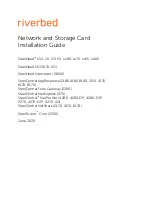
Dual Band Wireless VoIP Gateway
User’s Manual
26
SIP Caller ID Obtaining:
Select the part of the SIP packet from the VoIP Gateway to obtain Caller ID.
There are several places where the Caller ID is located.
Remote-Party-ID Display Name -
It is located at SIP
→
Remote-Party-ID
→
Before [<sip:]
Remote-Party-ID User Name -
It is located at SIP
→
Remote-Party-ID
→
After [<sip:], Before [@]
From-Header Display Name -
The standard way is in SIP
→
Message Header
→
From
→
SIP
Display info.
From-Header User Name -
It locates at SIP -> Message Header -> From -> SIP from address before
[@].
Put Caller ID In URI:
This feature is to put Caller ID in URL. The Caller ID is located in SIP
→
Message
Header
→
After [From:], Before [<sip:] by default settings. It will be located in SIP
→
Message Header
→
After [<sip:], Before [@]if ticked.
INVITE With Remote-Party-ID Header:
Check the box to comprise the information of Remote-Party-ID in
the message header of INVITE. Different format of INVITE header might cause the call not to be connected.
Please consult with your VoIP Service Provider before enabling it.
Callee Quick Media:
VoIP Gateway will send RTP to remote party immediately as user answer an inbound
call.
FXS Hunting For Unknown Number:
Select the response for an incoming call which the called number is
not exist in on the VoIP Gateway.
Disable
–
VoIP Gateway responses 404 not found.
Hunt and Transit Dial
–
VoIP Gateway sends alert to an available FXS port and dial the number to
PBX as the FXS port picked up by PBX. It works with SoftSwitch or IPPBX to allow a remote client
reach the PBX extension for one step dial. (For virtual extension)
FXS Group Hunting/ Ring Type --
VoIP Gateway sends alert to an available FXS port for hunting
group.
Enable SIP
“rport”(RFC 3581):
ATA puts
“rport” in SIP packets for SoftSwitch to deal well as ATA put
under NAT.
Support URI Percent-Encoding(RFC 3986):
Check the box to encode/decode the letters of the basic
Latin alphabet, digits, and a few special characters which follow RFC 3986.
Call Hold Compatible With RFC 2543:
It is used to set the procedure of Call Hold being compatible with
RFC 2543.
Enable SIP
‘Allow’ Header:
It is used to put
“Allow” in SIP packets. The Allow header field lists the SIP
requests supported by ITA when ticked.
Enable SDP
‘ptime’ Attribute:
It is used to put
“ptime” in SDP packets when ticked.
Use Redirect URI As
‘To’ Header (Receiving 3XX):
It is used to change
the content of ‘To’ header field
when receiving 3XX.
Respond
‘BUSY HERE’ while no line available for hunting:
It is used to reply
‘BUSY HERE’ to the
calling party while no line is available for hunting.
















































